#Clark Connoisseurs 2
Text
1 note
·
View note
Note
‘straight on til morning’ is so delicious and mesmerising, thank you so much for it!! i’d love to hear about your writing process/tips & tricks if you don’t mind!
thank you so much!!! i'm so happy to hear you enjoyed it!!! :D
as for my writing process... man. im one of those guys who can't write anything longish without outlining. like, A Lot. i also do all my outlines by hand in a physical notebook because that's just what scratches my brain itch nicely and makes the story marinate better in my head!
sotm started off as me going "NOBODY has written a proper long story about kon's knockout and tana trauma?!?!! NO ONE?!?!?" (well, there was one i saw, but it hadnt been updated in like. 5+ years and hadn't really gotten into the meat of it yet iirc.) it sort of manifested in my mind as two distinct images: 1) kon looking at the glint of light off the rim of a teacup while trying not to cry + asking dick grayson what to do, and 2) kon asking clark why he wasn't a child worth protecting.
my first step with a longfic is always to take those initial images, throw them onto a plot diagram, and then fill in the spaces in between. the og one for sotm looks like this!
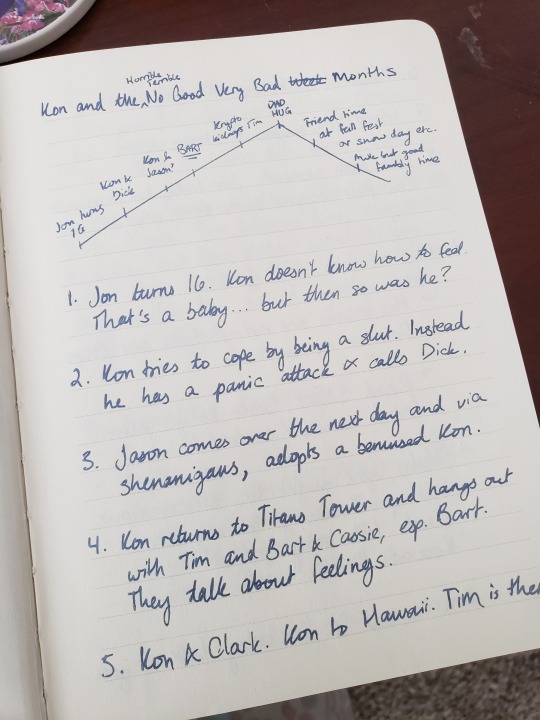
after that i go flesh out each point further and develop scenes per chapter. like, here you can see each chapter's basic plot points, but then as i got to each chapter i'd further flesh it out a Lot in the notebook, with as much detail as i could think of. for example, ch5's outline and notes look like this:
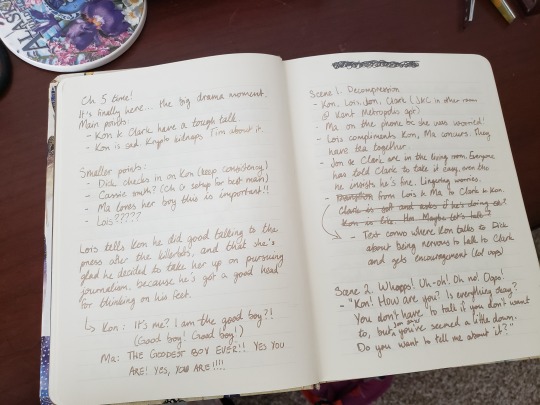
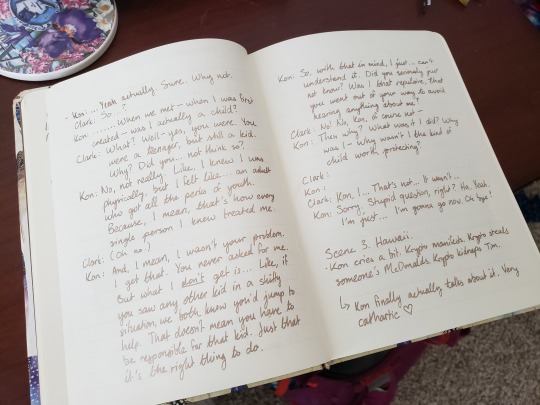
when i outline, i tend to try to imagine both the general vibes for a scene and specific dialogue notes, because i like sorta having guidelines for how to steer the scene as i write it. otherwise i tend to get pretty indecisive as to where it's going, and then i stop writing to think (or overthink) about what should be happening.
so when i do get a new idea and deviate from the outline i actually go back and rework the entire thing dhfjkds!! this happened in sotm, when i decided i wanted to add an extra chapter and focus more also on kon's career crisis, especially as it relates to his realization that OH, he's traumatized by tana in more ways than he knew. so i went back and outlined and fiddled with the last leg of the plot further:
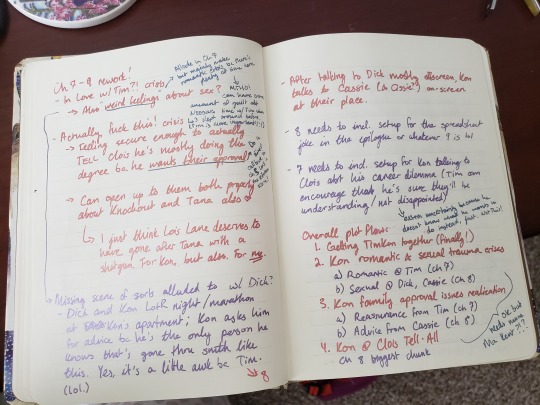
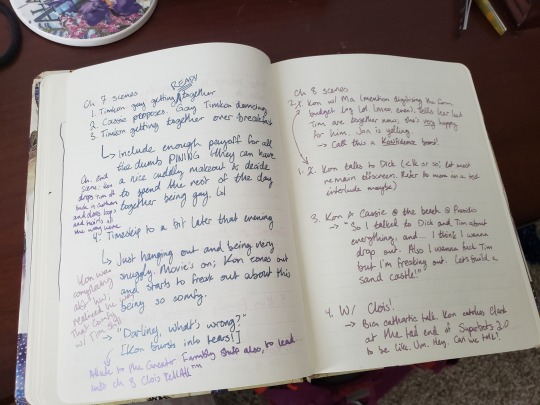
and ... yeah that's about it!! i work pretty much In Order on everything i do, so it's: outline, outline some more, write the chapter, outline the next chapter, etc.
...also i'm not gonna lie i did partly just use this question as an excuse to show off some of my pretty pens. i am so weak for pretty pens. connoisseur of gelly rolls in particular. <3
ty for asking!! i hope this shed some light on it/actually answered what you were interested in, it was a fun writeup to do :)
32 notes
·
View notes
Text
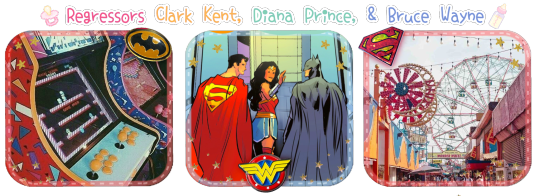
Since I got an ask or two about these cuties, here's a whole headcanon post for the trinity!! Bruce, Clark, and Diana are my absolute faves so I'm happy to write for them ❤️ 💛 💙 a little diana centric because I haven't put down HCs for her before - enjoy!!

First, the kiddie's ages! I think Diana acts the oldest, she's pretty firmly around 8 or 9. She got babied a lot being the only child on Themyscira, but she missed out on a lot of the fun rowdy parts of childhood! Clark comes next, same kindergarten age as usual, around 4 - 6. He can be pretty independent but looks up to Diana a lot! Bruce is the baby, he stays in baby ages or maaayyybee goes up to 2 if he's feeling real big.
Bruce and Clark think Di is the coolest person in the entire world, and love to follow her lead when playing! Which can lead to a bit of trouble because most of her playing involves jumping out of trees or seeing how fast they can fly in circles. She's extremely chaotic which makes the trio kind of a handful.
Diana and Clark squabble over who gets to hold Bruce. Usually Clark wins out because he's more responsible (no, Diana, you cannot fly with the baby)
Bruce and Clark always want to hold Di's hands whenever they go anywhere
Diana looooves having her hair braided and she let's the boys do it! Bruce loves it especially, he focuses VERY hard on making it look neat and nice
Even if shes a little rowdy, Diana definitely knows how to be a big sister when it comes down to it! If she's put in charge she does great at the role, she keeps all the kiddies together and under watch! She's also very good at patching booboos, and making kiddies smile when they're scared!
She's also really good at telling stories!! She knows a whole bunch of awesome mythical tales by heart, and she gets very into acting them out.
All of them love crafts, specifically friendship bracelets! They all have them, and they end up having to take them off when they're big again, but they always end up making new ones next time.
Clark calls Diana "Di" or "D-D", when Bruce feels like talking he calls her "princess" with the utmost respect (it sounds more like pimcess but he tries)
They all have those adult footie pajamas for their respective personas, courtesy of Diana who REFUSED to leave the Walmart without them
They all have a lot of hero toys! Both of each other and their Justice League friends :) they fight over who's the best/strongest/coolest JL member literally every time
They like to play outside! Mostly because Clark and Diana have so much energy to burn off and no house can properly contain super powered kiddos. Clark likes to play baseball, Diana likes to play tag, and Bruce just tries his best despite being 2
They nap in a pile always!!!! They either cuddle up on Bruce's massive king sized bed, a long couch, or the floor with an unruly amount of pillows and blankets piled around
In the same vein: pillow fort masters!!! They love having secret bases, whether that be a pillow fort, treehouse, under a bed, a room they've taken over, etc.
In true mouse-indulgent fashion, I always imagine Alfred looking after them. In my heart Alfred was the original "every kid in need of a parent within 50 miles is mine now" connoisseur, and homesick Clark and Diana are free real estate. Plus Wayne Manor has all the coolest stuff. But really anyone can take care of them if they're strong willed enough, or they can look after each other :]
#agere#fandom agere#agere fandom#agere headcanons#dc agere#batman agere#superman agere#wonder woman agere
73 notes
·
View notes
Text
TBC #6-11 9-13 May 2023
I am jetlagged and don't have the time or the brain to write up anything beyond some bullet points, so here goes:
I spent almost as much time at Dial Arch as I did in the show. This is not a bad thing, especially when there are friendly British fans and friendly performers and crew about. Imperial pints, yay! UK spirits measures, boo.
The VIP was worth doing once. Subtle references to the Eleusinian Mysteries on the kykeon bottle, nice. I don't know what the spec is but basically it was a drink for people who don't like whisky--mostly pineapple and other fruit flavors, presumably with some Dewar's in there somewhere. The museum/hallway scenes with Yilin and Sam put some nice flourishes on the Persephone storyline.
The three high points of my shows were these: 1) a Full Persephone with Lily, managing both X:1s and the Elysium coda. 2) a new-to-me Hades 1:1 with Sam, which brought new meaning to the word "underworld." 3) Fania bouncing back and forth between queen of Troy and queen of Mycenae.
Other things I knew that I'd enjoy, and did: seeing Ingrid on as Cassandra and the Watchman. Spending a loop in Peep with Lily and Isaac (I still can't get that stack-of-drawings trick to work, though).
New discoveries for me this time included a bunch of scenes that I hadn't witnessed before, and performers I'd never followed before. Ally Clarke as Artemis, holy smokes, and as Luba. Brenda Lee Grech as Macaria, ditto. Omar Gordon as Luba and then Agamemnon (with Fania/Clytemnestra!).
Thanks to FOH for taking pity on five of us huddled under two tiny umbrellas during a sudden downpour, and letting us into the lobby early.
I think I'm a real connoisseur of the blinding / Troy finale now, although I can't quite articulate the difference between when it works for me and when it really REALLY works for me. It's almost always moving and in fact more of the scenes were moving to me this time--I think knowing the space and the rhythms better meant that I could just get swept up into the narrative more easily. So I was tearing up at scenes both familiar and not. The bit where the Watchman mournfully takes up Iphigenia's red cape and holds it up to a rope as if it were a sail--sob.
There were some other 1:1s and walkouts and such, which don't need enumerating. All of them gifts.
I finally found the Gallow Green postcard and the owl bedroom! The end.
12 notes
·
View notes
Text
Just finished watching Supergirl 6x04 and oh boy let me tell you i was nervous for the whole freaking episode, let’s go:
1. Baby Lena being excited to actually join the team at the Tower. She’s such a baby, trying to help as much as she can🥺
2. I knew the imp lady wasn’t trustworthy. It was too easy. On the other hand she’s right, Kara’s father pretty much made the decision for her no questions asked and even tho it ended saving her, it doesn’t mean it was easy
3. Brainy eating his feelings away: i can totally relate to this.
4. Nia is the MVP of the episode, not gonna lie.
5. I just love how everyone calls Kara ‘Supergirl’ except for Alex and Lena. Just dropping it there as an important piece of information.
6. At first i was like Alex what the hell!? But sometimes you have to make decisions that may not be comfortable, i guess it’s about the greater good.
7. Sister-in-law bonding, i’ll take it! Give it to meeee
8. Lena pretty much destroyed when she found out that they weren’t going to save Kara, at least not in that moment. The yearning for her wife to come back is real and honestly? Same, these two have been apart for too long (it’s mainly because of Melissa’s maternity leave i think).
9. Where’s Kelly? I miss Kelly! She grounds everyone.
10. The team is lacking but at least they are stepping up to their game.
11. Lena freaking Luthor saying that she understands Alex, but she doesn’t think she would have been able to make the same choice of saving pretty much everyone versus saving Kara. There’s a similar scene between Kara and Clark, when she sent Mon-El away, Clark says that if it comes between Lois and the rest of the world, he doesn’t know if he’s capable of doing it. Kara clearly was capable even if it affected her and even if her feelings for Mon-El were strong as it was shown before. It’s curious they decide to parallel moments between Kara and Lena with other romantic couples.
12. Also, Alex telling Lena that it wasn’t her fault🥺 baby just wants to help. Hopefully we see Lena staying at the tower and becoming the scientist that the team needs.
13. Lena the scotch connoisseur *chef’s kiss* now we can finally see a friendship building between Alex and Lena and the strong bond they share over the love they have for Kara
14. Buckle up buttercup, Midvale ride coming up! Honestly i wanted and episode with the superfriends going WITH Kara included but i guess this works just fine.
Bonus: no Lex or William, also that’s a win for me.
#cw supergirl#lena luthor#supergirl#kara danvers#alex danvers#brainiac 5#brainy#nia nal#dreamer#kelly olsen#j’onn j’onzz#m’gann m’orzz#supergirl spoilers#ale watches supergirl
21 notes
·
View notes
Text
Starstruck: Part 2
Brian May x Fem!Reader
This is Part 2 of a multi-part fic. Click the links below to read the Masterpost, the previous part, or the next part of the fic :)
Masterpost / Part 1 / Part 3
Summary: When studying at Imperial College in the 1970s, your path is crossed by a beautiful boy as much in love with the stars as you.
Warnings: swearing, slight sentiments of sadness
Historical Inaccuracies:
I realise that ‘Time Waits For No One’ was partially a composition by Dave Clark, and not only by Freddie, but I’d imagine that he’d have liked that whole concept anyway, before Clark came along with his musical.
The picture below is from Christmas Eve, 1969, but we’re going to pretend that it’s from February, 1975 :)
Word Count: 4.3k
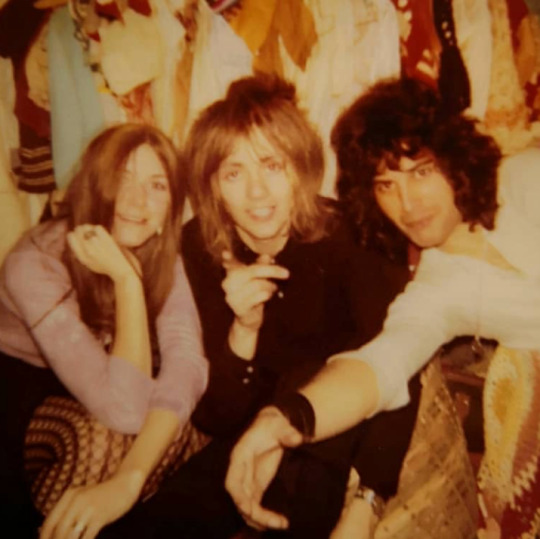
‧⁺˚*·༓☾ ☽༓・*˚⁺‧
You awoke with a terrible sadness in your heart, and heavy-limbed, you climbed out of bed to the sound of rain and somebody making coffee in the kitchen. With a look at your alarm clock and a start, you realised that it was already ten minutes past eleven.
You traded your pyjamas for slacks and a jumper Heather had once knitted for you, wondering why melancholy overwhelmed you as you combed your hair from your eyes.
Dazed by sleep, you wandered into the kitchen with a yawn shuddering your frame. You blinked blearily at the shirtless blonde in your kitchen who was drumming his fingers on the counter along to the tune he hummed.
“Roger?” you said, confounded.
He spun around with an equally bewildered expression, his hands raised as though he’d been caught doing something he shouldn’t have been doing.
His features broadened into a smile. “Y/N! You live here too?”
“Too?” you said. “Who else do you know here? And put on a shirt, Rog. You’re dressed if you’re in my kitchen.”
Roger stuck out his tongue at you, but pulled his shirt from where it’d been slung over a barstool.
You returned his lovely expression and he rolled his eyes at you in good nature.
You’d known Roger since you’d started at Imperial College and he’d started at London Hospital Medical College; you’d met him at the stall he kept in Kensington Market, selling clothes. Always talking about cars and his love for them, Roger was funny and charming, and quite intelligent, though the latter was a thing he downplayed in favour of his looks. You had never understood why boys thought that girls didn’t want a smart boyfriend, and when you’d mentioned it to Roger off-handedly once, visiting on a day he was working at the stall, he’d simply shrugged. “I’ll get them one way or another,” he’d winked.
Then, a sophisticated, sunkissed lad who was folding clothes had snorted from behind a clothing rack. “You won’t get her,” he’d said, referring to you. He’d then introduced himself with, “Freddie Mercury, darling. I can tell you where to find the nice boys, because Rog here isn’t one of them.” Freddie, of East Ealing Art College, was shy but creative, fashionable, and utterly lovely. He had known Roger since before school, and, aside from the clothing stand with Rog, was also in a band with him and a couple of others. Roger played the drums, and you knew that Freddie was an incredible vocalist, because you’d once caught him humming to himself and demanded he sing you more. You had fit right in with Roger and Freddie since day one, with your sharp wit and passionate romanticisms, and the three of you had quickly become good friends.
“So who’s the lucky lady?” you said, putting the kettle on for tea. For some reason, you didn’t feel like coffee this morning. The thought of its bitterness suddenly drew bitterness from you. “Or should I say ladies?” you trilled.
Roger smirked, leaned against the kitchen counter. “No, just the one lady. Think she’s still asleep, though, so try to keep it down,” he shushed.
You shook your head at him. “If she knows what you look like, she knows what you’re like, Rog. Don’t think you’ve got anyone fooled.”
“You’re such a good friend, Y/N. So supportive,” he drawled sarcastically.
“Funny,” you said, “I was told exactly the same thing last night, but I think he meant it, at least.”
Roger winced. “No getting down for you, then?”
You lobbed a coaster at him, but he caught it. “You need to stop just throwing things when you can’t think of anything to say, Y/N.”
“Stop being a prick, then,” you sassed him back.
“Okay, grumpy girl. Just because your little friend didn’t like you back.”
“For your information, he was actually very tall.”
A soft padding sound reached you from the doorway, and you glanced over to see Heather appear in the doorway, her mane of hair sticking up to one side and her pyjama top only half-buttoned.
“The hell is it with you people and shirts?” you muttered. “You’d think your mothers never taught you how to dress yourselves.”
Roger laughed at your comment, and Heather looked between the two of you.
“You know each other?” she said.
“Heather, honestly?” you scoffed. “My friend Roger who works down at the stall in Kensington?”
“Oh,” she said. “Same Roger?” You just blinked at her. “Common name,” she shrugged.
“You two know each other?” you gestured between her and Roger.
Roger’s smile was easy; he turned to Heather and his eyes ran over her, his lower lip between his teeth. Heather’s body language was obviously responsive.
“Ugh, no!” you said, rubbing your eyes. “Not a good image.”
“I thought we looked quite good together,” Heather flirted to Roger as you shuddered.
“Please don’t. Least not before breakfast,” you groaned, sliding off of the barstool as the kettle boiled.
Heather giggled, and you could still see Roger looking at her in your peripheral vision.
You busied yourself with making tea and pouring it into a thermos. Roger had walked over to kiss Heather, and you couldn’t get away from the sight of your two friends necking fast enough.
“I’m going out,” you said, grabbing the thermos, your keys, and boots.
“Oh, any chance you’re going to see Freddie?” said Roger from the doorway to the hall, arms around Heather.
You narrowed your eyes. “Why?”
“Got a message for him.”
“Could you not just telephone him?”
“There’s no phone at the stall.”
“Later, then?”
Roger frowned. “It’s important, please?”
You sighed heavily. “Fine, but only because I’m such a good friend,” you mimicked his words from earlier. “What is it, then?”
Roger grinned. “Tell him Clements says okay and eight o’clock sharp.”
Your puzzled expression seemed to amuse him. “I was going to tell you, but I’m sure Freddie will.” He waved a hand. “I haven’t got time right now.”
“You haven’t— oh forget it.” He’d gone back to snogging Heather, and there was simply no point in nagging him when it would be faster just to find Freddie.
⁺˚*·༓☾ ☽༓・*˚⁺
“Fred?” you poked your head around the stall, trying to spot him between the racks of colourful jackets and corduroy trousers, but failing for the life of you.
He popped up from underneath the table and you nearly leapt from your skin.
“Oh, hello, darling! How lovely of you to visit me,” he beamed, smoothing hair back from his face. “To what do I owe the pleasure?”
“Jesus, Freddie, you scared me,” you exhaled laboriously, still recovering from your shock.
“Sorry about that, dearie. I’m afraid I’ve upset the moneybox and spilled it all under the table,” he said with an expression of dismay. “Help me look?”
You eyed your already questionably-clean trousers. “Yeah, alright then,” you said, squeezing into the stall beside Freddie. “Any idea how much was in there?” you asked as you sank to your knees.
Freddie lifted the cloth covering the table and threw it to the side. “Afraid not. Deacy usually handles finances and all that, after Norman Sheffield’s fuckery at Trident, y’know.”
You knew the soft-eyed, cheeky John Deacon as well. As the bassist in Freddie and Roger’s band and student of electrical engineering, Deacy (as he was known) was simultaneously the most well-mannered boy you’d ever encountered and also the greatest connoisseur of dirty jokes. Despite being only a year younger than you and Roger, Deacy was Freddie’s protegé, in a way, because Freddie had taken the younger boy under his wing in matters both of the musical world and of the world in general. You were quite sure that Freddie believed Deacy to be an innocent in need of protection, and that Deacy intended to keep his precious mentor fooled, particularly because some of the disco nightclubs that John had shown you and Rog suggested rather the opposite of his supposed personality. All in all, he was as dear to you as Freddie and Rog.
You laughed. “Freddie, this is just little coins. I’m sure you would’ve been okay to look after that.”
“Yes, well, not much time to count money when the most handsome men in London seem to stroll through this here market almost constantly,” Freddie huffed indignantly and you smiled in amusement. “Are you looking?” he said.
“Yes, yes,” you assured him, hastily picking up the coins in your immediate line of sight before beginning to scavenge for those which had rolled farther away on their escape routes.
“So, why are you here? I know you like our lovely little shop, but you’re usually studying on Saturdays.”
You sighed. “I probably should be. But Roger’s shacked it up with one of my housemates, my roommate, actually—”
“Heather?”
“Yeah, Heather.”
“Oh yes, he’s definitely her type,” gushed Freddie, spotting another coin and tossing it into the moneybox gleefully.
“He’s hers?” you said.
Freddie peered at you. “Well, really, Y/N. Roger’s type is everyone.”
“Fair enough,” you nodded. “And, oh,” you remembered, “I have a message for you, from Rog.”
“Ah. What’s it, then?”
“Uh, it seemed kind of cryptic, but he said you’d understand.” Freddie motioned for you to go on. “Let’s see. ‘Clements says okay and eight o’clock sharp’,” you quoted.
Freddie paused in his treasure hunt and clapped, “Oh, excellent!”
“Fill me in?” you pleaded finally, weary with excitement for that which you did not know.
Freddie clasped his hands. “We’re playing a gig, tonight, at the Union Bar!” he exclaimed. “We normally don’t play that small any longer, what with our increasing popularity, but we thought it would be nice to do a bit of an intimate concert once more, before we shoot for the stars and lose that privilege entirely.”
“Oh, that’s fantastic!” you said, knowing you were free tonight. You’d always wanted to see their band Queen, but the circumstances had never really lined up for you to do so, though Freddie had even offered for you to sit in on their rehearsals many a time.
“And you can finally meet our last puzzle piece!” said Freddie, his eyes alight. “Oh, he’ll adore you. Have I mentioned he’s studying some sort of science too? Maybe even similar to what you’re doing. I always seem to forget the name of it, though Bri is quite particular about it. He’d positively kill me with that glower of his if he knew I’d forgotten the name of it again. Oh, bugger,” Freddie went on. “It’s something to do with space. It’s on the tip of my tongue, I swear—”
But something had clicked inside of your head, and your palms felt oddly sweaty.
Freddie and Roger and Deacy had always referred to their fourth bandmate as simply ‘Bri’ or ‘Brimi’, or, in Fred’s case, ‘that bitch’, and so it had not occurred to you. You hadn’t known what he’d looked like, or anything about him, really, other than that he was a talented guitarist of a short temper and a motherly heart. But now you realised, with a fluttering sensation to accompany the thought, that you knew precisely who Brimi was, and that you had practically memorised his smile from seeing it nearly every morning of the past semester. Now, suddenly, the calloused fingers you had held in your own made perfect sense— Brian, the guitarist.
“Astrophysics,” you murmured softly.
“I’m sorry?” said Freddie, who had only just stopped in his flood of excited words.
“Astrophysics,” you repeated more loudly.
Freddie’s brow creased. “Yes, yes that’s it. I’d better commit it to memory, now. But how’d you know that? I’m sure I’ve never actually managed to tell you. I would’ve remembered such a momentous occasion.”
Your head felt suddenly quiet, though the thrum of your heart was sure to replace that silence with its own deafening beat.
You looked away, combing your fingers through your hair. “We’ve got the same morning class for our major,” you said, “and, uh, yesterday evening, when Heather went off with Roger, Brian and I had a drink together.”
Freddie gasped so vehemently that your eyes flashed back to him to be sure that he wasn’t suffering a fit or something.
“In that case, I’m sure he adores you already.”
“Freddie!”
“Think about it, Y/N! You’re both besotted by an absolutely absurd science that makes no fucking sense, and you’re friends with me and Roger and Deac already, so you must’ve gotten along like wildfire and a dry forestscape!”
“Freddie, that’s a horrible analogy.”
“That may be so, darling, but from the light in your eyes, you know what I mean.”
A strange blush engulfed your cheeks and you touched your fingers to your face, willing the flush to disappear. It didn’t.
“No idea what you’re on about,” you said.
“There’s still time.”
“Still time for what?”
Freddie threw his hands into the air. “For things to happen.”
“Nothing did and nothing will,” you countered, a little sternly.
“You’ll be lying to me before the month is through. I’ll find you more time with him, if that’s what you need.”
You ignored Freddie’s suggestive comments. “Time waits for no one,” you remarked instead.
“Now that’s a good line, isn’t it? Do you use it often, or would you mind terribly if I made something of it?” Freddie inquired.
“Pretty sure it’s a rather common expression, but I’m sure you’ll make something wonderful of it,” you said fondly, knowing his poetic habits.
Freddie winked at you. “I’ll certainly do my best. Now, I think we’ve got all the coins, so I say we get off of this filthy floor that the dust bunnies appear to have taken over, or what’s your view on the matter?”
“Time to depart the good Realm of Floor,” you agreed, stretching your creaking legs and giving Freddie a hand up.
“So you’re coming tonight, yes?” Freddie brushed dust and lint from his velvet trousers.
“Of course,” you said. “I wouldn’t miss it for the world.”
“You’ve missed all the other times, though,”
“I know, Fred,” you exhaled softly. “But I—”
Freddie’s hand covered your shoulder. “You don’t have to explain yourself to me, darling. We’re friends, remember?” he smiled comfortingly.
“And friends will be friends,” you responded, as you and the others had taken to saying, originally as a gag, but now as a sort of mantra to keep you going through the harder days.
Freddie smiled again. “Are you busy, or do you fancy going for lunch?”
“Sounds good,” you said. “Where were you thinking?”
“Just the pub. You know how much I enjoy their fish ‘n’ chips.” He meant Kensington Pub.
“Oh yes,” you recalled it very well. “I know.”
“Excellent! Well, I’ll just tidy up quickly and close, and we can be on our way.” You nodded, helping him to rearrange a few out-of-place things before he waved you off. “You don’t work here, dearie. We can talk about dear ol’ Brian while you wait for me, if you like.”
“Clearly, you’re the one who’s obsessed with him.”
“I won’t dispute that. He’s rather nice when he’s not attempting to control every little note of our music.”
“Which is... often?” you said.
Freddie nodded with ardour. “He’s got taste, mind you, but sometimes that taste just gets overbearing, if you know what I mean,” his tone was cheeky.
You folded your arms and leaned against the wall. “No, Freddie, I’ve entirely no clue what you mean.”
⁺˚*·༓☾ ☽༓・*˚⁺
After lunch, the two of you took the tube from Kensington Station to Freddie’s flat.
Freddie opened the door to several different cats meowing at the return of their human, and he greeted each one by name, rubbing fluffy backs and scratching behind waiting ears as he passed.
The cats had encountered you many times before, and though many had at first been apprehensive at the presence of an outsider, they now greeted you as one of their own.
“I thought maybe you’d like to borrow a couple of our records to listen to before the concert tonight,” Freddie said, tossing his keys onto the kitchen counter and making his way over to where his record player and vinyl collection resided. He gestured to the crates and stacks of records, encouraging you to take a look while he retrieved Queen’s own works.
Despite the fact that your household contained a total of eleven people, Freddie’s music collection was far more impressive than that of your residence. Jimi Hendrix, Elvis, The Beatles, Led Zeppelin, and Aretha Franklin seemed to dominate the collection, but there was a heavy presence of classical and operatic compositions too, from Prokofiev’s Romeo and Juliet to Chopin.
“You have so many records,” you said, wishing there was more room in your monthly budget to spend on records, music that you could replay as much as you wanted, rather than waiting for— hoping for— the radio to cycle through your favourites.
“I’ve spent many years building up my collection,” Freddie told you, as though he knew what you were thinking and wished to remind you that such collections were not accumulated overnight; there was still all the time in the world for you to develop your own reserve of records.
“Ah, here we are!” he slid three volumes from a shelf, smiling fondly at the covers. “We’re not The Beatles, but I daresay we’re quite fantastic all the same.” He handed you the records, and you took them with care.
The first was mauve in colour scheme and depicted a person hoisting a sheared microphone stand into the air, illuminated by a singular dramatic spotlight. The second was a highly-contrasted rendering of all four members of Queen in (once more) spectacular lighting, and diamond formation. The third and final was all of them again, lying in a strange circular heap, eyes intense and skin shining with what was likely supposed to be sweat.
Your eyes strayed to Brian on the cover of the third album, the neck of his shirt pulled open, his lips parted and his eyes dazed. The image was suggestive, and Brian was attractive.
Blinking stray thoughts away, you tucked the last album behind the others and cleared your throat as subtly as you could manage. But Freddie had not thought you subtle; he grinned at you astutely.
“Rock and roll, then?” you said, though you already knew the answer. The point was, you were trying to change the subject.
“Rock ‘n’ roll,” Freddie emphasised. “We’ll have you educated in no time, don’t you worry. Homework is listening to those records. Come back again soon and I’ll swap you some Led Zeppelin and Aretha Franklin.”
“Varying taste,” you commented, desperately trying to coerce your mind from its previous focus.
“We’ve got to expand yours,” Freddie said. “Now go home and listen! We can’t have you standing mute and still in the crowd tonight! I plan on making sure you get up front, but I need energy from you for that to be justified, Y/N.”
“Okay, Mercury,” you smirked. “Such high standards, so demanding.”
Freddie sighed, “Got to be, darling. How else would I augment the quality of my music?”
“I’m definitely out of my depth here, Fred.”
He patted your shoulder. “Get out and go home and listen,” he said.
You made a face and Freddie stuck out his tongue at you. “See you later, dearie. Tell Brendan Clements when you arrive and he’ll get you past the crowds.”
“Fab. Later, Freddie.” You gave him a wave as you departed and he blew you a kiss.
⁺˚*·༓☾ ☽༓・*˚⁺
You supposed there was one good thing about Heather and Roger’s newfound relations. Well, maybe two.
The first was that you knew Roger and he knew you, and he knew that you would dye his hair permanently peroxide green if he ever hurt Heather intentionally.
The second was that, after this morning, Heather and Roger had headed off to Roger’s place for a few days, meaning that you were free to dance around your room to whatever music you wished without suffering shyness and embarrassment about your moves when you were inevitably discovered. Your other housemates worked most days, and conveniently, your shifts at the local cafe did not coincide with the absences of your household; you would now have the house to yourself quite a bit.
Having abandoned your boots by your wardrobe, you picked up the first record, simply titled Queen.
“Memorable already,” you murmured, feeling oddly exhilarated.
The record was on the deck by your bed within moments, and you flopped down atop your covers to enjoy the music in one of the purest ways you knew how— by lying back on your bed and spreading your arms and letting the melodies carry you away.
The energy kicked in immediately, and to the vivacity of the music you would have sold your soul.
Freddie’s voice was unrelentingly powerful, and unmatchable in beauty. You caught hints of Roger and Brian singing between the thrum of Deacy’s bass lines, their own instruments, and Freddie’s lead vocals, and the effect of the four of them together was unforgettable, astronomical, meant to make history.
Their talent as musicians was riveting if appreciated on its own, but Queen were artists too. How they could have thought up the stories they told, both through lyrics and without any words at all, you did not know.
Record after record, their voices rose together like waves, rushing over you and tossing you in their midst. You felt you were made of stardust, not only in the sense that everything of the past was still atomically part of everything present, but also in the metaphorical way; you felt light and heavenly, like you were floating above the ground, dancing on clouds.
Most of Queen’s songs, to your delight, made you want to dance— the best music made one want to dance. The songs that didn’t make you want to dance made you feel other emotions entirely— they moved you to tears.
By the time ‘In the Lap of the Gods… Revisited’ had signalled the end of Sheer Heart Attack, you had curled up on your side, gazing unblinkingly at the slowing vinyl. It wouldn’t have been too far off to say that listening to Queen's music felt like a transcendental experience.
When the needle passed the final break in the record’s surface and met the space between the break and the record’s central label, you leapt up. Immediately, you swapped the last record for the first, so as to begin the cycle of listening again. You wanted to, needed to, hear it all again.
How lucky you felt, to be going to the concert of such artists the very same night, and how serendipitous it felt to not only know, but to be friends with these artists.
⁺˚*·༓☾ ☽༓・*˚⁺
You had dabbed your eyelids with silver and outlined them in black, the way Freddie had taught you to, though you had never worn your makeup so until now. Your dress was a cotton-tulle mix, black and bell-sleeved, and spotted with flecks of silver like little stars; the effect was somewhere between casual and glam. A good balance, if you should be so bold as to say. Platform sandals completed the regalia, which you felt was a fitting way to describe the outfit which one wore to the concert of a band named Queen.
Between your third and fourth cycles of the three Queen albums, Heather had rung the telephone in the hallway across from your room.
“Hello, gorgeous!”
“Hiya, Heather,” you greeted her cheerily.
“I’ve been out all day, so I’m sorry if you’ve tried to get hold of me.”
“I’ve been out for a good many hours as well. Hope you didn’t miss me too terribly,” you sniggered.
“Pish posh. Not in the slightest. Been making out with Rog—”
“Stop right there, Heather.”
She made kissing sounds on the other end of the line.
“Remind me why you’re calling again?” you said, half-jokingly, half-seriously. Half-seriously because it was getting dreadfully close to eight o’clock, to Queen playing at the Union Bar. “And where are you, anyway?
“Calling to tell you Roger and his band are playing at the Union tonight, and to ask if you’re coming. I’m currently at said drummer’s place getting ready to tag along for said concert.”
“‘Course I’m coming,” you said. “Finest new musicians I’ve heard in years.”
Heather snorted. “You sound like my grandfather— top of the morning to you— finest musicians!” she laughed.
“Just because you haven’t actually heard their music yet,” you reprimanded her.
“About to. So this Freddie told you about the concert, like Roger said he would.”
“Yeah, our friend Freddie.”
“Oh. Oh god, Y/N, I’m fucking stupid. It’s the same guys as you usually talk about. I forget that. It’s like my mind thinks they’re part of some alternate reality, or something.”
“Please tell me you’re not on LSD.”
“No! I promised you I wouldn’t do anything silly for a month. You said LSD counted as silly, so despite being surrounded by all sorts of rockstars, I’m currently stone cold sober in every sense of the word.”
“Unfortunately, it appears you’re still under the effects of Roger Meddows Taylor,” you laughed.
“Shush, Y/N. He’ll think I’m some wacko already in love with him on day one.”
“You are a little bit, though, aren’t you?”
You could almost see her roll her eyes, see yourself respond with a knowing smile toward the insight that she was forever downplaying her emotions to seem less of a romantic than she was. But she was a romantic. Very much so. And she got her heart broken far too often for someone who loved as much and as wholly, as unconditionally, as she did.
“See you in a bit, mwah,” Heather kissed the phone and you cursed her loudness. She laughed at your string of obscenities and put down the phone.
With a final look in the mirror, hoping that your fashion choices had not been too bold, you swept out the door and into the night.
‧⁺˚*·༓☾ ☽༓・*˚⁺‧
A/N: hello beautiful! thanks for reading this. just send me an ask if you’d like to be added to my taglist!
taglist: @melting-obelisks @stardust-killer-queen @hgmercury39 @topsecretdeacon
Masterpost / Part 1 / Part 3
#tina’s writing#starstruck#brian may#brian may x reader#brian may x y/n#brian may x you#queen#freddie mercury#roger taylor#john deacon#queen fanfiction#1975#1970s#fic
81 notes
·
View notes
Audio
Listen to: Clark Connoisseurs 2 by Supreme Cerebral x Eloh Kush
2 notes
·
View notes
Text

heyo! this is admin envy/holly comin in hot with my young trash child clark: local garbage stoner, taco bell connoisseur, ex-juvie goer, and proud drummer for wet brain. below are some deetz about him! feel free to hmu on d/scord @ yam mingyu#7579, or on tumblr ims if u wanna plot something out. (tho tbr... im on discord way more often LOL). this honestly has no right being this fucking long so im gonna apologize in advance please forgive
born in new york city via in-vitro fertilization to two wealthy mothers. he grew up there, learned the way of the #streets, and considered it to be his forever home. that was until he turned 13, and his grandmother falling ill led to his moms hauling them out to the tiny town of dingle to care for her in her final years.
three major factors led to clark absolutely despising his early years in dingle. 1) his ailing grandmother was an actual through and through asshole, 2) he had just come out to his moms, and transitioning in a tiny town versus the liberal heart of the city was an actual nightmare, and 3) there was literally nothing to do. this led to him lashing out, fucking around, and landing himself in trouble with the authorities more times than he could count.
this delinquency eventually caught up with him — his ass was tossed into a correctional facility when he was 15, after he accidentally burned down an abandoned home while getting stoned with his hooligan friends. they all dipped on him, leaving him to deal fully with the wreckage and the punishment.
after this minor wake up call, he got his life… slightly on track. he started actually going to school, partied a little less, and got involved with a better group of friends (ie: one connor roth). he managed to scrape up enough academic motivation to graduate high school, though not enough to even consider attending college once graduation arrived.
his mother (the mean one, obv) gave him an ultimatum: either get a job, or get the hell out. he is now the world’s worst dishwasher at rosie’s diner. though the titular rosie is generally distrustful of this little miscreant, he managed to snag the job because she was good friends with his grandmother. (little does she know, clark actively hates his grandma). he could find another job, yeah, but they always hook him up with free fries.
his grandmother passed away when clark was sixteen, but he only very recently found out that she left him her beachside home in her will. seems like a nice gesture, yeah, but it was mainly just to spite his mother. giving a free house to her unmotivated stoner son, where he could basically waste away? truly haunting her post-mortem. he now lives there with connor + torrance! he still works as a dishwasher, though, despite not really needing to... mainly just for weed money.... and free fries. gotta love the free fries.
he also does twitch streams as a small side gig, streaming the shittiest possible games. he has a puny cult following on the platform, who consistently send him worse and worse games to try out and yell about, but he makes essentially nothing off of it. he just likes the attention, mostly. (ex: this & this)
the one thing clark takes seriously in his life is drumming. he truly believes to the depth of his soul that he can make it as a professional drummer, and that if he doesn’t, there isn’t much else left for him in terms of occupation. this has led to a palpable desperation as he’s grown older — and to him taking wet brain a lot more seriously with the more time that passes.
clark truly thrives on being an annoyance. if he can find a way to push someone’s buttons, he will. there’s a disgusting pleasure he gets in messing with people, which has led to many constant citizens of the town to genuinely hate his crusty ass. as long as he can still get gigs, he doesn’t really care.
recently, he has tried to get into writing deeper lyrics for the group. he’s mainly the go-to guy for stupid and goofy lyricism, but he’s attempting to tap into his… feelings… whatever those are. (he has a lot, really. he just doesn’t wanna talk about them).
his main interests include weed, taco bell, adam sandler movies (both ironically and un-ironically), video games, stupid t-shirts, partying, going to gigs, and being a general dumbass.
if you actually read all this shit and STILL want more, i got a nice about page for him right here, as well as a pin board right here !!! (gotta rep the aesthetic)
5 notes
·
View notes
Text
CC2

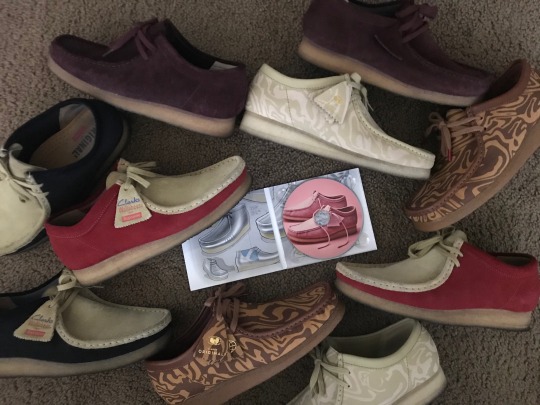
Clark Connoisseurs 2
12 notes
·
View notes
Text
Cocktail College: How to Make the Perfect Martini
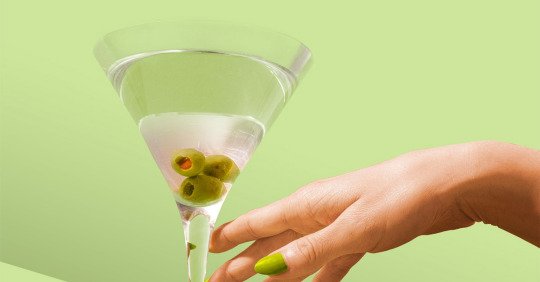
This episode is sponsored by Knob Creek. The right bourbon can elevate your next cocktail into an experience worth savoring. So, look for a brand that doesn’t overlook the details and sets the standard for bourbon. That’s Knob Creek. It’s truly the real deal: An authentic, classic line of American whiskeys, with proofs ranging from 100 to 120. Knob Creek is aged longer to produce a full-flavor experience as rich and deep as its history. With every drop, you notice the attention to detail Knob Creek puts into its bourbon. So, strive for a little more substance. Because, when you choose to go deeper, you’ll find so much more to appreciate.
The Martini has an important role in drinking culture and is beloved by many. It’s James Bond’s drink of choice, the classic cocktail emoji, and host Tim McKirdy’s favorite cocktail. In this episode of “Cocktail College,” McKirdy is joined by John Clark-Ginnetti, owner of 116 Crown in New Haven, Conn., and a Martini connoisseur.
Clark-Ginnetti makes sure every customer who is served his Martini at 116 Crown has an experience that indulges all the senses. He shares his personal preferences on how to make the drink and what he thinks makes the combination of gin and vermouth so special. Clark-Ginnetti even teaches cocktail culture at Yale University — so, rest assured, his opinion is one you can trust.
Tune in to learn how to make the perfect Martini.
LISTEN ONLINE
Listen on Apple Podcasts
Listen on Spotify
MAKE JOHN CLARK-GINNETTI’S MARTINI
Ingredients
3 parts Plymouth Gin
2 parts Boissière Dry Vermouth
Garnish: lemon peel
Directions
Add all ingredients to a mixing glass.
Add ice and stir until chilled.
Strain into a chilled Martini glass.
Garnish with a lemon peel.
CHECK OUT THE CONVERSATION HERE
Tim McKirdy: John Clark-Ginnetti, thank you so much for joining us today and welcome to the show.
John Clark-Ginnetti: Thank you very much. Happy to be here.
T: I’m excited about this one. I’m a huge Martini fan, so this is a big episode for me. I really can’t wait to break down the cocktail with you.
All cocktails start with a great story. Cocktail history is documented by people who enjoy a liquid libation and they don’t let facts get in the way of a good tale. So, can you tell us what are some of the most recognized theories behind the genesis of the Martini? What’s the one that you believe?
J: I will tell you the truth: Of all the commonly dispensed versions, I believe almost none of them. I think this is one of the drinks that is so ubiquitous, fraught with differences, and bandied about for years on bar stools, at tables, and restaurants in epicenters of the world, there’s almost too much motivation by interested parties to ever settle on one true beginning for the Martini. It cannot be one.
I mean, we can’t even agree on whether or not we’ve been visited by aliens. That seems to be a pretty straightforward one. So I don’t know if we’re ever going to come up with who had the brilliant idea to put gin, vermouth, and a lemon peel together to make what I would call the most classic, most delicious drink ever.
T: I think it is an otherworldly cocktail. Is the fact that, if I go into my phone to text you, search for the cocktail emoji, and the Martini glass comes up, is that a sign that this is the most iconic cocktail in the world?
J: Yeah…
T: You’re hesitant there?
J: I’m not an avid emoji user. I have three or four and I’m very sure that I’m using them wrong. But, I think [the emoji] certainly points to the fact that it’s the most thought-of drink. Part of that is just because of the physical stature. It’s got its own glass. Once you get to that, you’ve reached a certain point. It’s like when you can just go by your first name.
T: Madonna. Cher. Martini.
J: Martini.
JAMES BOND AND THE MARTINI
T: Bond, James Bond. That’s a nice segue there. Building upon that iconic status, you do have this conversation that I think, within the bar world, is not even an argument anymore — shaken versus stirred. Even outside of the bar world, I think most people know that is an error. I’m not sure that everyone knows why that is, though. Let’s start by breaking that down.
J: I tend to see some charm in it as well. I don’t think it was intentional — I don’t think Ian Fleming said, “I’m going to sew this little mistake into the rug because everything else is so perfect.” Everybody makes mistakes.
As a Bond fan, one of the cool things that we’re seeing in some of the more recent Bonds is that he’s fallible and he’s been made to be a little more human. But there is no reasonable argument to be shaking vermouth, ever. I wonder if the statement is true that pretty much everyone knows. I think everyone has heard it, but I don’t think they’re really believers.
I am a huge advocate of a Martini being three ingredients and three ingredients only. I don’t think that olives belong in it. I don’t think that vodka belongs in it. I certainly don’t think that espresso or peanut butter belong in it. I’m also not so in love with myself that I’m unwilling to concede that there is going to be some degree of the population that believes everything that comes in a v-shaped glass with a stem is going to be a Martini. I’m sure there’s somebody with a wall of Bond posters and collectibles that is going to shake their Martini, gosh darn it, no matter what you say to them.
The other interesting part about the Bond legacy is that, while the Martini is the most understood, agreed on, and ordered drink by Bond, throughout the years he has segued and had some Vespers. He’s getting a little less uptight.
T: As the advertisers come in, he’s partial to a Heineken these days and whatnot. You mentioned that vermouth should never be shaken, in your opinion. Can you tell us why that is?
J: It’s actually very striking that this comes with the Bond conversation. For me, principally, it’s a matter of looks. I subscribe very profoundly to the idea that all of the senses should be engaged when enjoying a drink or food. That’s why I think that the lemon twist is so important to the Martini.
When that glass rises to your face, before it even gets near your nose, that lemon just serves to wake up the senses and say, “Get ready for something delicious.” By the same extension, when you’re shaking wine — which is what vermouth is — it doesn’t look very good. A Martini should always be crystal clear. It should almost look innocent. It should look like spring water. There should be that wink of vermouth when you look at it.
As somebody who’s been staring at beverage alcohol for 20 years, sometimes my younger employees are struck when I can tell that they’ve added a little bit of vodka into their soda, just by the viscosity. I might be taking things too far when I analyze a drink, but nine and a half out of 10 times, the drink I’m analyzing is either one that I’m going to drink or one that I’m going to serve.
I think taking that editing eye to it is important. Much like you wouldn’t put your Châteauneuf-du-Pape on a paint mixer before you drink it, you shouldn’t be shaking your Martini, right?
T: Well, I’m sorry to say that they’re doing it in “Succession.” But yeah, you shouldn’t be, of course.
J: There’s no point to it. You’re not trying to aerate the drink. You’re not trying to introduce citrus to the drink, especially when being enjoyed by a guy who’s wearing an Omega, Brioni suit, and packing a Walther. No shaking.
T: I was probably wrong earlier in saying that everyone knows not to shake, but I do think we’ve put that to bed as to why we shouldn’t be doing it.
This cocktail is going to be very different from most of the ones that we’re exploring in this series in that there is no one fixed recipe. The Martini is so personal, which is what I love about it. I find, maybe the more interesting conversation to be about the ratios. Again, there’s this amazing tie-in to history. Can you tell us about some of the more recognized ratios? Maybe some of them have a cool backstory? What’s the one that you personally go for yourself?
J: I think that the ratios are much more up for debate than anything regarding shaking or stirring. As the person who is stomping my feet and lighting a match over the proper way to make this, I always have to concede that the Martini that I serve, technically, is a Gin French. The ratio has more vermouth than would be counted on by your average Martini imbiber. That said, I think the only responsible way to understand the Martini and really be a student of it is to investigate what the fans have to say about the drink.
If the Martini was a baseball player and was being inducted into the Hall of Fame, there are stats. You’re standing on this stage because you hit this many home runs. You committed this many errors. For that, you get a reason to stand on the stage. There’s going to be something written on the plaque that’s going to be hung on the wall and acknowledge that those numbers got you the right to have that place. I think that’s really where the debate comes in with the Martini.
Shaking gin and vermouth will not get you onto the stage. Off brands will not get you onto the stage, or if there’s no attention paid to ingredient quality. The Apple Martini is never going to be part of the Cocktail Hall of Fame. Once those attributes are satisfied to get you onto the stage, it’s really about what gets written on the plaque. That, whether it be baseball or Martinis, inherently goes back to the fans.
Some of the best literature that’s been written about the Martini is always talking about how there are the senses — the smelling of the lemon, the fact that it needs to be ice cold — but what happens afterwards is where I always find the poetry. In the class that I teach at Yale College with Dr. Jessica Spector, when we talk about the Martini, the title of that day’s course is “The Martini Is Civilized.”
I like to read from “The Sun Also Rises.” Hemingway is choosing Martinis to set a mood. They’re talking about how, “It’s good. Isn’t it a nice bar?” You could be hoisting a Heineken. You could have an ice-cold beer. But, the fact that they’re having Martinis is in there for Hemingway to set the understanding of what’s trying to be achieved by both parties sitting there.
As you said, the Martini is going to be different from anything else that gets discussed on your show. When the Martini is in a book or on TV — I hate to keep going back to Bond, but I’ve made this case in the class — you have to ask, “Why is Bond drinking a Martini?”
My theory is that he needs to be civilized because he’s a murderer. He is a mass murderer. He’s an assassin. He’s probably killed more people than any of the horror villains. Bond’s got the Freddy Kruegers of the world beat by the thousands. How do you take this horrible person and temper him into somebody who’s doing it for the honor of sovereignty? Everything else has to be that. He has to be well dressed. He has to have an Aston Martin. When you consider the drink, he has to have a Martini.
HOW TO MAKE THE PERFECT MARTINI
T: At the beginning there, you talked about your preferred serve being the Gin French. In terms of technical build, what are we looking at there, gin to vermouth? On top of that, given how we’re speaking about this being a very personal drink, do you actually have a standard serve at your bar that you’re teaching your bartenders? Are you saying, “OK, unless someone says anything, this is the way that we’re going to serve them?”
J: We have a menu, and when somebody orders a Martini — as you said, it’s a personal drink — the first question that’s asked is, “Do you want our Martini or would you like something else?”
In the case that they’re ordering from the menu — that’s, of course, what I prefer, because I like them to be buying what we’re selling — the thing that also figures into that is the brand. If you were to look up the Gin French, you’re going to get three parts gin to two parts vermouth. Now, there’s nothing in there that calls for a brand.
As we know, gins and vermouths both can taste very different. This is one of the reasons that I felt comfortable calling ours the Martini, because I thought that the Plymouth gin, the Boissière dry vermouth, and the lemon twist conveyed more of a Martini taste and feel. Again, the origin of this is so dubious that we’ll never get there. We came to that combination by reading through countless great books about the drink, tasting that, and, honestly, hearing from other people who were tasting it that said, “Yeah, this is the Martini that we want to sell. This is what we’ve been reading about. This is the feeling. This is the taste. This is the look. This is the smell. This is a Martini.”
If you’re not accounting for those brands, it’s really hard to qualify that. If we were to make this with something with a much more juniper-forward flavor, the ratios would change. Then, in my mind, it wouldn’t be a Martini.
T: I love that you do have it on the menu as well, because that’s how I like to start a night. If I go to a cocktail bar full of proprietary drinks, I feel like a bit of an asshole ordering a Martini, but that’s how I love to start the night.
How important is it, even if you don’t have it on the menu, just to have a house spec so that, when that situation arises, unless someone has their preferred way of it being served, that everyone at your bar is making it consistently?
J: I think it’s incredibly important. If you open a bar, you’re going to be making them. It’s not something that’s never going to get ordered. It’s the same as a Manhattan. You can leave it off your menu, but you’re going to be asked for it. There should be a house spec because it’s going to become part of your identity.
There’s two sides to every bar. They serve good drinks. They don’t serve good drinks. Once they serve their drinks, that’s going to be one that you’re measured on. Whether or not it’s on the menu or not, if you have three different bartenders making it three different ways, that’s an issue.
Somebody who knows about restaurants as intimately as you do, knows that consistency is of the utmost importance. People come back because they had a good experience. No one is showing up because the last time they came it was garbage. They might show up despite that, but they don’t show up with that in mind. It’s incredibly important.
In fact, my favorite uncle talks about his days bartending. I cringe when he tells the stories from time to time. He talks about how he would make up a pitcher of Martinis and a pitcher of Manhattans and just shove them in the ice. He was playing catch up. These are the good old restaurant war stories where somebody walked out or hurt their foot, and you had to make drinks for 1,500 people. At the very least, though, if he was making 10 gallons at a time, at least they’d all taste the same.
T: Every Martini he served that night might have been consistently bad, but they all tasted the same, which is good. You’ve got to be consistent.
J: Yeah. They could have been dog water, but they were all dog water.
T: That’s pretty good. I would say that that’s actually a better indication of a bar, that I know what I’m going to get. If I go to a local bar and I know that their draft beer is lousy, I’ll get a little bottle of Modelo. I don’t want it to be great one day and then the next day, the line’s rubbish. The beer’s got no head. If you know what you’re getting, I think we like that as humans. I think that’s important here.
J: That was the argument for bar tools 20 years ago. I would hire people and they’d say, “I can eyeball two ounces. I know how to pour an ounce. I don’t want to use the jigger. What are you talking about?” I had a guy, when I was doing my first training 14 years ago, say, “Did you ever use a jigger?” I said “No, and I know the drinks were inconsistent. So we’re going to do that here.”
T: Exactly. I think it’s those small incremental changes that all combine to really up the quality.
I want to talk about the specific ingredients now. I have a confession to make: I got into Martinis via the New Western style of gin, if you want to call it that. I actually got into it through a Japanese gin that was very light and more citrus-forward. For the longest time, I’d been put off by the flavor of juniper, but that’s a horror story going back to my kitchen days, for a different time.
How do you feel about New Western gins versus the classic London Dry? Of course, you’re using Plymouth, which I would say falls in between, somewhat. Maybe it’s a little bit more New Western. What are you thinking about within those three different styles of gin?
J: I’m always an advocate for progress and change, so I don’t think that something is so sacred that it should never be touched or messed with. Nothing’s above reproach when it comes to that.
I don’t think that all gins, regardless of where and when they were founded, are going to be in a Martini. In my mind, the Martini is the brands and proportions that we use at 116 Crown. Again, I love any sort of progress. I’m not even that opposed to people calling it a Martini if it’s got a spicy green bean in it. If that’s the expression that you’re looking to make, then good on you.
I am consistently mesmerized when I see the expressions that people are putting on gin. Gin sort of lends itself to that as well. As long as it’s got some juniper, anything else goes. That almost has a nod to the culinary world, where sometimes it’s hard to judge creativity because you don’t know where the lines are. You can say, “This is a gin because it has juniper, but then we’ve done all these other things to it. So, this is our expression of gin.”
You could see it in molecular gastronomy. You might order a strip steak and get a bowl of tapioca bubbles, but they were filled with gravy and redolent of steak. You could grin and understand the sometimes comic message that the chef was trying to get across. I see that very much when it comes to the newer expressions of gin. If you have something coming out of the East and it’s featuring produce that’s associated with the East, you think, “Oh, OK. Japanese gin. Got it.”
T: Exactly.
J: It’s going to have that juniper. I think Hendrick’s was really early to the party with this. I always say to people, if you’ve got three or four minutes in the afternoon to waste and you want to see a really well-produced, likely extraordinarily expensive website, go to the Hendrick’s website.
There’s cucumbers getting launched out of cannons. Roses are falling from heaven. It’s just cucumber, rose, cucumber, rose, top hat, unicycle, cucumber, rose. But, when you look at the bottle, there’s no cucumbers and there’s no roses. There’s a sprig of juniper.
You have that history and, in the case of Hendricks, you have playfulness. In the case of some Eastern gins, you have a sense of place. I thought St. George’s gin lineup was always so cool because they’d promote that “This is the one that grows outside the distillery. Enjoy. Take a shot at that one. That’s super cool.
T: Talk about bringing terroir into spirits. We talk about it in different forms and you can argue whether you can taste terroir in whiskeys that have been distilled using a base of organic grain, but then aged in barrels for 10 years. Another great example is The Botanist, where they hire a full time forager on their island, who’s going around all year picking ingredients for that gin. That’s gin with a sense of place. You can’t argue against that. I think that’s one of the incredible parts of it and informs what you’re saying. You know where the line is. You can use new ingredients. You can use different ingredients. But, you’ve always got to question why, and whether they work.
J: Absolutely. Even in the case of the Martini, I think it was Franklin Roosevelt who was mixing the Martinis himself and did not make his usual recipe. He poured it for some heads of state, presidents, and secretaries of other countries, and was so unwilling to admit that he made a mistake. Henceforth, that’s how they were served in the White House.
For terroir, The Botanist is a great example. For the London Dry ones, look at the ingredients on Bombay Sapphire. It’s a London Dry gin called Bombay. They were obviously looking to get your head somewhere else and possibly celebrate some conquering and possible other things.
T: Things we probably wouldn’t celebrate today.
J: Yeah. Well put. Thank you. Advancing the agenda is always in the favor of the medium. You have to advance the message to get attention to the medium. How many people want to drink the exact same gin that their grandparents drink, unless they’re thinking of their grandparents?
T: That really brings us back to the soul of the Martini and it being this cocktail that you can personalize. Maybe there’s different Martinis for different times of day. If we move on from gin to vermouth, again, it brings us back to that ratio conversation. I personally think the 50/50 is a crime against the Martini, but I know that it’s very fashionable these days. I can see a place for it.
Maybe you’re using a vermouth that’s more expressive than your classic styles that you might get from France or Italy. (We’re talking dry vermouth here.) I’ve tried newer ones or smaller-production ones that are more expressive. I can see why you would probably want to mix that in a 50/50 Martini. What’s your approach when it comes to that? Obviously you want the harmony of the two ingredients, but the vermouth is the supporting actor and it’s got to know its place. We’re not shaking it, so we’re giving it respect.
J: It has to be the supporting actor. That’s why there’s awards for supporting actors.
T: There’s perennial supporters out there who just do a great job.
J: Yeah, I agree. Unfortunately, vermouth is a beautiful thing. Vermouth is wonderful with a sprig of celery at 1:30 in the afternoon in somebody’s garden, whose child you might be involved with and meeting parents for the first time. You don’t want to fire anything back.
T: You don’t want two Martinis?
J: Don’t want to have the double size Vesper, you know, and have to have somebody’s folks calling you an Uber. For sheer assertiveness on the palate and alcohol content, vermouth should be there to help the gin achieve its greatest expression.
T: I’m going to move us onto something after this. I want to ask a quick yes or no question, which is orange bitters?
J: I am in the yes business.
T: You’re in the yes business for bitters?
J: For me, though, it’s a no.
T: Oh, OK.
J: I’m in the yes business, but that one, for me, it’s a no. It’s unnecessary. It’s too much.
T: Is that the chef trying to have their imprint where it’s not needed, going too far, and not letting the produce shine?
Let’s move on to stirring. You mentioned engaging all the senses, not just when you’re drinking, but when you’re making this drink. I’ll shout-out Maison Premiere in New York. They have a fantastic tableside Martini service. When they make it, they tell you the story of it as they’re doing it. It’s a whole procession. They pull their gin from the freezer, stir it, and they’re not gauging by how cold the glass gets or how many revolutions. It’s all by sight and viscosity.
Is that something you subscribe to? Can you tell us a little bit more about what we should be looking for, if that’s the case, in that scenario?
J: I really like that sort of a presentation because it’s so deeply personal to that restaurant. Unless you’re going to a chain, you’re looking for an original point of view. I think them doing it that way — it might not be my way — is a wonderful way to do it. Just the act of them forcing you to put your pleasure in the hands of their senses is interesting. They’re looking at this. They’re judging by viscosity. They’re using their eyes. There’s something that is deeply caring in there that all restaurants and bars should have. It’s a really great way to get that point across without having to put it on the website: We deeply care about you. If you walked in stone cold off the street, didn’t know where you were, and ordered that Martini, you would come away feeling that. It’s also quite brilliant.
You can always argue good and bad, but that’s opinion. Once you give something a story, once you give it a history, it’s much harder to refute. You can always say, “Hey, I don’t like Martinis without orange bitters, because I don’t like them.” But, this is why you see so many restaurants who are using grandma’s recipes and so many places that have this deep sense of purpose and place. That’s because it’s irrefutable. That’s the story. If that’s your grandmother’s sauce, that’s your grandmother’s sauce. I wasn’t there.
T: That’s something that will come up a lot, I believe, in these conversations. You’ve got to have conviction. You have to have questioned why and have a reason for why you’re doing something. Maybe one of the reasons I do love the Martini so much is because it reminds me of cooking.
There’s all these things that you’re taught in the kitchen: You should season mushrooms as you’re sautéing them, but other vegetables you should season afterwards because the salt’s going to concentrate. There’s all these little techniques. Scientifically, can we prove them? Absolutely not. At least you’re thinking about it, though, and you have a reason for the way that you’re doing whatever it is. That comes back to that viscosity and the other things that you’re talking about.
J: Those are also nice little tip-offs, too. I had a chef friend tell me one time that one of his “tells” for what kind of kitchen he was in was seeing if they had soy sauce and where they grabbed the handle of the spoon. The metal spoon in the pot is hot at the top, but cooler at the bottom. You could have somebody come in with this dynamite resume and they’re burning their hand when they try to stir the sauce. He would just know right off the bat. If you’re watching somebody sauté mushrooms and season at the same time, there’s a sense of reassurance that they at least check that box.
T: This might be, again, just one of these individual things. I’ve got two little things to run by you. One is cracking the ice before you stir it. The other one is that someone’s told me before that I should be stirring my gin over ice first and then adding vermouth to finish and stir so that we’re not diluting the vermouth too much. Where do you stand on those two things?
J: I think that it’s a matter of your ice and environment. I have another chef friend of mine that keeps his risotto in the same place in the kitchen and it’s not on the stove. He just knows his kitchen so well and knows exactly what he’s going to get when he grabs from that risotto every single time.
For instance, the bar at 116 is lit stone. Three or four years ago, we replaced the lights from fluorescent to LED. All of a sudden, the ice is melting much slower in the bin. It was so strange. We were like, “Oh, God, the ice well. Why is this lasting so much longer?” It was because it wasn’t as hot. The LEDs aren’t throwing any heat. Then, we were able to dim them. That was the other thing. Things are looking different. The area is changing. So I think this is another place where you really just have to trust the methods that have been developed in the place that you are. I would be reluctant to give a full yes or hard no on either of those.
We’re talking about temperature and dilution. Does the shaking tin go under hot water right after you serve your drinks? That’s going to change things as well. If you’re keeping your gin in a freezer and it’s going into a hot or cold tin, you’ve got bigger problems to figure out than cracking the ice and adding the vermouth. If I was going for a really, really dry Martini, I would probably stir some of the gin over the ice, pour that out — because that’s going to be the most watered down — and then start over. If I really just wanted that cold gin in the style of W.C. Fields, glancing at the vermouth, I would want to go as far as I could in that direction.
T: Like you said, there’s so many different variables there when it comes to ingredients and equipment, temperature-wise. I think one thing we can all agree on is that the glass should be coming from the freezer. Do you still subscribe to the Martini glass yourself, or are we talking coupes, Nick and Nora? I mean, those glasses look great.
J: They do look great. I like a Martini glass for a Martini. I am not stuck on the very conventional “v” with no extra ornamentation. I have used Martini glasses with pronounced lips, which is always very much appreciated by the staff because it’s a lot harder to spill them. I’ve used a concave “v,” a convex “v.”
It’s not that different from the conversation we’re having about gin itself. It’s harder to be creative in a way that’s going to be understood by an audience if they don’t have a touchstone. Once you understand that emoji-shaped Martini, the rest can be more easily internalized.
I say this all the time to people about the restaurant. Is this the best drink I’m ever going to make? Absolutely not. Unfortunately, I have to sell them after I make them. If I only made it for me, then I’d only have one guest a night and it’d be me. You have to be cognizant of your audience as well. If you’re going to have a place that has a more sophisticated audience, I think it’s a little bit easier to get creative in that way.
When it comes to the Martini going in a Martini glass, I think it’s appropriate and appreciated. That being said, — and this happens from time to time at 116 — when somebody wants a half a Martini, we put it in the Nick and Nora because it’s a much nicer presentation than serving somebody a half drink. At that point, why don’t we just serve it to them lukewarm with bugs in it?
T: I’m wondering if you have any final thoughts on this drink? I think we can definitely talk for longer about it. I know I could, but is there anything pertinent that we haven’t covered?
J: Any time I have these types of discussions, I always like to temper it a bit with the idea that what’s really important is for the end user to be satisfied. I could sit there and tell you this is the right way all day long, but if it just doesn’t do it for you, you shouldn’t be scared off or write off the drink automatically.
One of the cool things about the Martini is that, no matter how right I think I am, at the end of the day, it’s all up to your taste. There are very few things that I don’t like to eat and drink, but if they ever come across my plate, I’m not doing it. I’ve eaten and sipped my way through so many different genres and flavors. There’s not a lot that just doesn’t do it for me. If somebody tells you that they don’t like to eat fish, it’s probably not the mountain you want to die on. If you can get a little bit of salmon dip onto their plate once in a while, you’ve got to be happy with that.
Especially with the Martini, it’s so nuanced. My first Martini order was done to impress the people I was with. I had never tasted it. I didn’t know if I liked it. I ordered it completely wrong. The bartender, who was not excited to make the Martini, asked if I wanted it up or on the rocks. I didn’t know what I was talking about, so I asked for it on the rocks. When she gave it to me, I said, “Can I have it in the better looking glass?”
A lot of the Martini itself is in the glass, but a lot of the Martini comes from somewhere else. I think a really great quote about the Martini is from James Carville, where he says, “The ultimate feeling in the world is to be about two- thirds of the way through my second Martini with people I like. Anything seems possible.” If you can get there — I don’t care if you have orange bitters and are drinking it hanging from the ceiling by your feet — that’s what it’s about. That’s what it is.
T: Then you’ve got to stop. If you get the full way through the second one, then not a lot is possible.
J: It can be, but what are the proportions of these? Are these 50/50, because I could probably have two more?
T: That very much is true.
GETTING TO KNOW JOHN CLARK-GINNETTI
T: It’s been great to explore this cocktail with you, John. I loved the discussion. Could even do another one on this. Right now, I’d love to get to know you a little bit more for our listeners with our stock quickfire questions at the end here. How’s that sound?
J: Sure. Great.
T: Fantastic. First question for you. What’s the first bottle, brand, or general category that makes it onto your bar program?
J: Geez, that’s tough. How about genre? Because it would be gin. I love to work with gin just because it’s got so much character and there are so many ways to influence the character. We talked earlier about terroir. I think whiskey is a beautiful thing, but you’re giving it if the expression is from the wood. You just have so many more options with gin to give it that character.
T: Yeah. Gin’s the best.
J: Gin’s the best.
T: Second. Which ingredient or tool do you think is the most undervalued in a bartender’s arsenal?
J: This is just my opinion. Since we’ve been discussing the Martini, I think it is the fine-mesh strainer. If you are serving a drink up, which is to indicate without ice, I think that there should be no ice present at all.
T: 100 percent. I hate shards of floating ice in a Martini. That is a no from me.
J: Absolutely. I’ll take the bill, please.
T: Next question: What’s the most important piece of advice you’ve received in this industry?
J: Probably to just be yourself. Be creative. I’m not trying to sound too much like a Whitney Houston song, but that’s going to be the thing that’s most easily deliverable. If you’re out there and you have talent and you’re dialing it back at all, be as far in the “you” direction as you can go, because you’re going to do that better than everybody else 100 percent of the time.
T: Love it. If you could only visit one bar in the rest of your life, which bar would that be?
J: Not mine?
T: Oh, it can be yours.
J: Then it would be mine. Too much blood, sweat, and tears to go anywhere else.
T: I love it. Final question for you. If you knew that the next cocktail you drank was going to be your last, what would you make or what would you order?
J: Oh, it would be a Martini.
T: 100 percent.
J: All day long. The one I’ve been serving. I think it’s perfection, and if I was only going to have one more drink, it would have to be a Martini.
T: At least you’d feel somewhat happy to go, I think.
J: I agree.
T: Amazing. Well, John, thank you so much for joining us for today’s episode. It’s been a blast.
J: My pleasure. Very much my pleasure. Thank you so much for having me.
T: Look forward to the next time.
J: Let’s do it.
If you enjoy listening to the show anywhere near as much as we enjoy making it, go ahead and hit subscribe, and please leave a rating or review wherever you get your podcasts — whether that’s Apple, Spotify, or Stitcher. And please tell your friends.
Now, for the credits. “Cocktail College” is recorded and produced in New York City by myself and Keith Beavers, VinePair’s tastings director and all-around podcast guru. Of course, I want to give a huge shout-out to everyone on the VinePair team. Too many awesome people to mention. They know who they are. I want to give some credit here to Danielle Grinberg, art director at VinePair, for designing the awesome show logo. And listen to that music. That’s a Darbi Cicci original. Finally, thank you, listener, for making it this far and for giving this whole thing a purpose. Until next time.
Ed. note: This episode has been edited for length and clarity.
The article Cocktail College: How to Make the Perfect Martini appeared first on VinePair.
source https://vinepair.com/articles/complete-guide-martini-recipe/
0 notes
Text
A Pressing Appointment - Chapter 2
Story so far (HERE)
The result of the vote was Angst and then Smut (lots of Smut). So have a chapter of woobie angst and I promise the smut will follow soon :)
-x-x-x-
Gold spent the afternoon grinning like a fool. He was whistling to himself as he swept the workroom floor. Moe had eyed him suspiciously and asked if he’d been drinking.
“Nae a drop, boss. Just happy.”
It irked him a wee bit that everyone’s first question was ‘Are you drunk’, tell the truth he had no one to blame but himself for that being a sure bet. It wasn’t like he was drunk every day. There were times when he went for weeks with only the odd drink here and there. During those times he worked hard, kept his head down and stayed out of trouble. He even dared to hope that the nightmares were gone for good, but they always came back as strong as ever, robbing him of sleep to the point where drowning in whiskey was the only way to get any glimmer of peace.
He shook away the unpleasant memories of weird green light and heart-breaking loss. He had much better things to focus on today. He laughed softly as he put the broom away, he couldn’t remember the last time he’d been on a promise. There had been women in his life, but time and booze had made their faces indistinct. When he thought of them at all it was to recall the bad times, and there were plenty of those.
There were always bad times, and it occurred to him that Lacey had seen most of his bad times in Storybrooke. She’d pulled him from the gutter when he’d been so pissed he couldn’t stand; broken up more bar fights that he’d started than he cared to count; seen him hungover as hell puking into the little bog in the cells.
Gold raked his hands through his hair and groaned quietly. What was he playing at? His life was a mess, had always been a mess, he was a mess. This thing with Lacey was bound to go down the drain just as fast. He stacked the vase of roses onto the shelf in the cooler with more force than needed. A single red petal, shook loose by his rough handling, drifted to the floor. It curled on the grey tiles like half a heart. Gold stooped down and picked it up. The petal felt velvet soft between his fingers, a brief moment of tenderness in his rough hands.
Lacey’s lips had felt like this. His tongue swept over his bottom lip as he remembered the feel and taste of her. Looking at the rose petal he felt an unaccustomed sense of peace. Whatever this was with Lacey might not last beyond one night, but it would always be a good moment in his miserable life. It was worth trying for, even if it fell apart like everything else did.
Gold ducked into the Dark Star Pharmacy on his way home. He told himself there was no need to be shy about what he was buying; he was a grown man being responsible for his sexual health, not a spotty faced laddie buying raincoats on a dare.
He still hid behind his hair and feigned an interest in corn plasters and athletes foot powder when the Nolan bloke ambled by to the sweet counter.
Once the coast was clear he sidled over to the cock-sock shelf and hesitated. Flavours were right out. No matter how much a packet boasted ‘all natural’ or ‘realistic’ he wasn’t buying it. Nowt could make latex taste good.
He hesitated as he reached for a packet of plain ordinary condoms. What if Lacey was allergic to latex? Some folks were; the last thing he wanted was Lacey ending up itching and uncomfortable. Right; one pack of latex and one of the hypoallergenic non-latex. Of course she might already have condoms of her own, but he wasn’t going to presume. Him turning up with half a dozen rubbers might look presumptuous but fuck it, better to give Lacey the choice. His aunts had taught him that it was his dick and he was responsible for wrapping it, so he would be over prepared, better that way.
Clark gave him an odd look as he rang him up, but Clark was always on the verge of sneezing so odd looks from him where normal. Gold’s paranoid still made him squirm a bit as he handed over the cash for his supplies. He shoved the little boxes into his inside pocket and hurried home.
With a towel wrapped around his waist after his shower he decided that he would skip shaving. His hands were shaking too much to risk even a safety blade near his throat, whether that was excitement or the DTs he wasn’t going to question to closely. Decision made he turned his attention to his shirts.
By some fortune a spurt of energy had made him wash and iron everything he owned yesterday, which meant he had a choice; the black and white check shirt, or the plain white. The former had all of it’s buttons and he had worn it when he talked to Moe to get his new job. Moe had said he looked like a skinny lumberjack, probably not a good thing. The white one was missing two buttons, but he never liked fastening anything up to his throat, and it would look good with his dark blue jeans and that nice knotwork belt buckle.
His eyes strayed to the clock and he swore. It was already twenty to six, no time to dither. He whipped the towel from his waist and scrubbed himself dry. His damp hair was tamed with a quick shake and a rapid drag of his fingers before he threw his clothes on. A fast squirt of deodorant in his pits and he was as good as he was going to get. Fuck, time to go.
Gold jogged across the street outside his flat without looking. There was never traffic at this time of day. The squeal of brakes and blare of horn came as quite a shock.
The bright yellow VW Bug had stopped less than an inch from his right knee. The blonde woman behind the wheel was giving him a death glare, he would have flicked the vees at her, but he saw the Mayor’s wee son grinning at him from the back seat.
Gold braced his hands on the yellow bonnet, leaned forward and raised his voice; “You okay Henry laddie?”
Henry gave him a thumbs-up and a cheesy grin. The woman wound down her window and stuck her head out.
“I’m taking him home to his mother.”
Gold kept his hands on the car and edged his way around to the driver’s side door. Henry’s grin got wider; “It’s okay, Spin… sorry Gold. It’s okay this is my birth mother, I found her, but now she’s taking me home to Mom.”
Gold shrugged. He was a connoisseur of wrong choices, but this didn’t feel like one. Henry was a smart wee laddie and he trusted him.
“Okay laddie,” – he glared at the blonde, - “You drive safe. Please.”
The blonde, Henry’s mom, shivered and nodded. Gold let go of the Bug and stepped back onto the sidewalk. Henry waved at him from the back window and Gold found himself waving back before he shook himself and jogged onto Lacey’s place.
7 notes
·
View notes
Text
To Silence Wind Turbines and Airplanes, Engineers Are Studying Owl Wings
https://sciencespies.com/nature/to-silence-wind-turbines-and-airplanes-engineers-are-studying-owl-wings/
To Silence Wind Turbines and Airplanes, Engineers Are Studying Owl Wings

Every owl fancier has a story of the first time they heard an owl — or, rather, didn’t hear one. It’s unforgettable to see an enormous bird, whose wingspan can reach more than six feet, slipping through the air without even a whisper.
Justin Jaworski’s first close encounter came at a flying exhibition at the Raptor Foundation near Cambridge, England. “They trained the owls to fly very close to the audience,” he says. “My first experience was of ducking to avoid a collision. I heard only a very slight swoosh after it passed.”
Laboratory measurements have shown that the slight swoosh made by a barn owl is below the threshold of human hearing until the owl is about three feet away — a feat of stealth that biologists and engineers are far from completely understanding. But researchers from both disciplines are working to solve the riddle of silent flight — some with the aim of designing quieter fans, turbine blades and airplane wings.
Such owl-inspired innovations can reduce noise by as much as 10 decibels, similar to the difference in noise between a passing truck and a passing car, Jaworski and Nigel Peake write in an overview in the 2020 Annual Review of Fluid Mechanics.
Go gentle
Jaworski, an engineer at Lehigh University in Pennsylvania, is hardly the first scientist to be captivated by the puzzle of silent owl flight. In 1934, Robert Rule Graham — a British pilot and bird connoisseur — called attention to three structures on owl wings that might account for the owls’ silence.
More than 80 years later, his “three traits paradigm,” as Christopher Clark calls it, is still cited in many papers on owl wings. “He clearly knew birds very well, and he was an aeronautical engineer,” says Clark, an ornithologist at the University of California, Riverside. “Science was different in the 1930s. In our age of specialization, you don’t get that combination.”
First, Graham pointed out an unusual structure called the “comb,” which literally looks like a comb projecting forward from the wing’s leading edge. Second, he noted that most of the owl wing is covered with a soft layer of velvety feathers. Finally, he observed that the feathers on the trailing edge of the wing form a ragged fringe.
Most researchers still agree that the comb, the velvet and the fringe combine in some way to reduce noise, but the owl may have more tricks up its sleeve. “When all is said and done, I think we’ll have a number of mechanisms, including Graham’s,” says Clark.
To explain how an owl suppresses noise, it would help to identify where the noise comes from in the first place. For an airplane coming in for a landing, a large part of the noise comes not from the engines but from the flow of air around the plane, especially the sound produced at the trailing edge of the wings. The turbulent air rushing past the exposed edges of the wings translates to the dull roar you hear as the plane flies overhead.

Researchers trained a Florida barred owl (Strix varia alleni) to fly through a special recording room. The gliding owls generated very little sound in the range of human hearing (people can hear sounds above the dashed line). Low-frequency sounds made by owl flight are inaudible, no matter the distance. Humans can hear flight noise in the mid-range frequencies when the owl is between one and three meters away. Owl wings and feathers are especially good at dampening higher-frequency sounds, which can be heard only if a person is standing within a meter of the noise.
(Knowable magazine)
One way to reduce this noise would be to make the trailing edge of the wing less hard, more porous and more flexible. This may be the function of the owl wing’s ragged fringes. Jaworski and Peake have mathematically calculated how engineers might use such porosity and elasticity to reduce noise, and how to quantify that diminished din.
Those calculations are supported by wind-tunnel experiments: A variety of porous materials do dial down the noise. Work by Thomas Geyer at Brandenburg University of Technology in Germany has found that a poroelastic wing the size of an owl’s can be about 2 to 5 decibels quieter than a regular wing.
However, says Geyer, the right porous material is crucial; in the wind-tunnel tests, some materials actually increased high-frequency noise. Measurements of owls in flight show that their wings mute only frequencies higher than 1,600 hertz (on a piano, two-and-a-half octaves above middle C). Since this is roughly where the range of rodent hearing begins, it’s the range that an owl would benefit most from suppressing as it hunts for a meal.
Jaworski and Ian Clark (no relation to Christopher) of NASA’s Langley Research Center have attempted to mimic the owl’s velvet by covering a standard airfoil with various kinds of fabric. “The winning textile was a wedding veil,” says Jaworski. However, it may not be necessary to donate your nuptial accessories to science, because the researchers got even better results by attaching tiny plastic 3-D–printed “finlets” to the blades of a wind turbine.
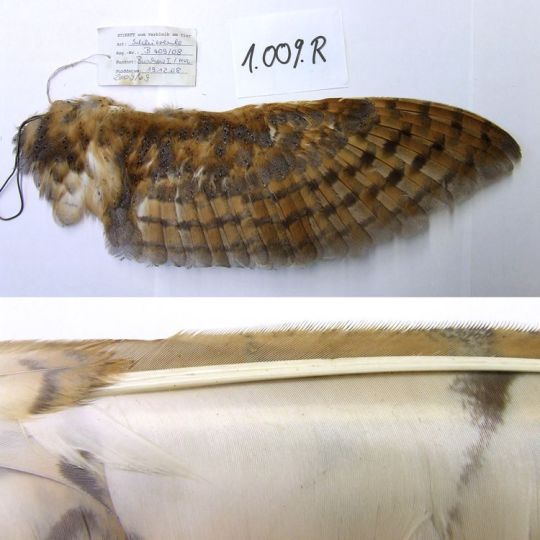
Research suggests that owl wings have three features that contribute to their silent flight: a “comb” structure (just visible at the wing’s top right), ragged trailing edges (visible along the bottom of the wing) and a velvety material that covers much of the upper left of the wing. The comb structure from a different specimen is shown close-up at bottom.
(Thomas Fritz Geyer / Brandenburg University of Technology )
“Over a certain frequency range, we saw a 10-decibel noise reduction,” Jaworski says. “That may not sound like much, but in air acoustics, engineers fight over two or three decibels. Ten decibels is half as noisy. That’s a massive change for any technology.” Siemens, a manufacturer of wind turbines, has apparently been listening, and recently unveiled its second-generation “Dino Tail” turbines that have combs directly inspired by the owl wing.
Feathery enigma
Though owl wings are providing new insights into noise reduction for aeronautical engineering, engineers have had less success describing the physics of owl flight. According to ornithologist Clark, the engineers may not even have identified the most important source of noise in owl aviation.
If you’re trying to build an owl, rather than a wind turbine or an airplane, you’ll notice several differences. Owls have feathers; airplanes don’t. Owls flap their wings; airplanes don’t. There’s a good reason that aeronautical engineers prefer stationary, solid wings to flapping, feathery ones: They are easier to understand.
But if you are a biologist, to ignore flapping is to ignore a fundamental ingredient in avian flight, says Clark. As bird wings flap they change shape, and as they change shape the feathers rub against each other, causing noise. This noise is frictional, not aerodynamic, produced by the contact of solid against solid.
In Clark’s view, the purpose of the owl’s velvet and the fringes is to reduce frictional noise between the feathers while flapping. Clark concedes that his argument would be moot if owls glided while hunting, but video evidence shows they do not: They flap when taking off, they flap when landing and they even flap when “coursing” for prey.

Scientists seeking to understand why the owl’s flight differs from other birds have studied the turbulence patterns left in their wake. Red and blue indicate vortices spinning in opposite directions.
(Roi Gurka, Costal Carolina University and Elias Balaras, George Washington University)
And the fringes are not only on the trailing edge of the wing, where the aerodynamic theory would predict them to have the greatest noise-reducing benefit. Fringes also exist on the leading edges of the feathers, where they do not affect aerodynamic noise, as well on some feathers that are not even exposed to the airflow. This suggests that their purpose is not aerodynamic.
Clark says that we may be asking the question backward. Instead of asking why owls are so quiet, we should ask why other birds are so loud. The answer is feathers. “Feathers are amazing structures, and probably the reason birds are so successful,” Clark says. But they come with an evolutionary cost: “If you’re going to build a wing out of feathers, they are going to produce frictional sound.” To become silent hunters, owls evolved special adaptations that reduce this disadvantage.
Owls are not the only kind of bird that has solved this problem. Some species of Australian frogmouths have independently developed the same adaptations. These birds are also carnivorous and have wings that are soft and fluffy with combs and ragged fringes. In Graham’s day, people assumed that frogmouths were closely related to owls, but genomic analysis has proved that they are not. While less studied than owls, they too are silent flyers.
“Evolution often takes a quirky path,” Clark says. “One way you can home in on the underlying mechanical principles, and tell them apart from quirks, is with convergent evolution.” When two unrelated animals have the same adaptation, it suggests that the feature confers a benefit — in this case, stealth.
At present, there are two ways to understand owl flight: an engineering view informed by the equations of fluid motion and wind-tunnel experiments, and a biological view based on anatomy, behavior and genomics. A truly integrated story will probably require both. Even engineers realize that idealized studies based on rigid, unfeathered wings are not enough. It’s quite possible that the owl uses its feathers and small shape adjustments of the wing actively, rather than passively, to manipulate airflow. Engineers aren’t even close to understanding this process, which spans several size scales, from the barbs of the feathers to the individual feathers, to the entire wing.
“What is missing to us is the microscopic point of view,” says Roi Gurka of Coastal Carolina University in South Carolina, whose experiments with flying owls have led to beautiful computer simulations of the flow field around a flapping owl wing. “I understand the wing,” he says, but understanding the role individual feather morphology plays in noise reduction is another matter.
While the scientists debate, the barn owl will continue flying as it always has: its face as round and imperturbable as the moon, its ears trained on its next meal and its feathers treading gently on the air.
This article originally appeared in Knowable Magazine, an independent journalistic endeavor from Annual Reviews. Sign up for the newsletter.
#Nature
0 notes
Text
Addition - Quick Design Solutions
Today we spent 2 hours in the morning focusing on one brief and creating quick designs from a limited amount of visual assets. I really enjoyed working on this one, using the simple logo and breaking it down from the + sign, as well as developing a consistent visual language through my experiments
For this brand the details were:
“ Brand task Addition is a sneaker store for collectors and fanatics. We stock classics from brands such as Adidas, Nike, New Balance, Clarks Originals, Red Wing, Fred Perry, 80sCasuals, Casual Connoisseur and much more. Keywords: Raw - Vibrant - Cutting edge - Independent - Counterculture”
I picked up on the word casual from some of the brand names. I also picked out the brush typeface based off the keyword raw. I picked this brief for the first one since it had a fairly extensive colour palette and I wanted to try it out. Even though there were lots of colours, it was easy to keep everything consistent using repeated motifs and the same typography throughout. I also made all of the photos I used (from unsplash) duotone to match in better.
The format was instagram squares so I wanted to create some pieces I thought could look good in an instagram feed as, with instagram, as well as the individual post, it’s important to consider how it looks placed in the grid layout of the profile.


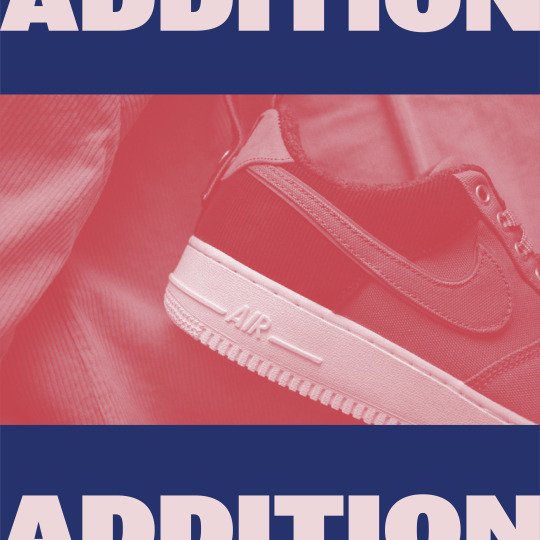
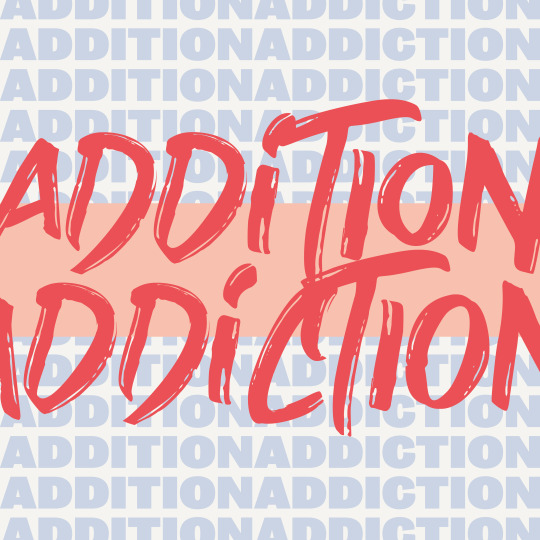















0 notes
Text
September 2017 Arts & Culture in Toronto
Skate Girls of Kabul (Sep 5 - Oct 8)
...now exhibited in the Aga Khan Park, these photographs present an uncomplicated celebration of childhood and girl power.
Caribbeantales International Film Festival (Sep 6 - 21)
Bringing Caribbean film to the world
Toronto International Film Festival TIFF (Sep 7 - 17) Hand-picked:
Our People Will Be Healed: Legendary documentary filmmaker Alanis Obomsawin provides a glimpse of what action-driven decolonization looks like in Norway House, one of Manitoba's largest First Nations communities.
Master Class - Larry Wilmore: Wilmore marks his first visit to TIFF by joining Jesse Wente for an insightful, engaging, and real conversation. How real? Make no mistake — Wilmore is the keeper of the 100s.
The Seen and Unseen: A 10-year-old girl retreats to a fantastical, evocative dream space to deal with the impending loss of her twin brother, in this imaginative film from Indonesian director Kamila Andini.
Marlina the Murderer in Four Acts: A young widow violently turns the tables on her would-be attackers, in this powerful, provocative, and visually stunning Indonesian take on the "feminist western" genre.
In Conversation With... Gael García Bernal: Artist, political thinker, and community builder Gael García Bernal sits down to discuss his inspiring career and present his latest performance in Joan Chemla's If You Saw His Heart.
Birth of a City - The Story of Toronto (Sep 9)
Birth of a City the story of Toronto, is a short film performed with live narration and the music.
Toronto's Heritage of Innovation - Aerospace (Sep 10)
Space historian Jordan Bimm presents our fourth talk...how Toronto has contributed to innovations such as the Canadarm, the Beaver, and the Avro Arrow, well-known innovations that changed the world -- and the galaxy.
Sustainability & Innovation: The Future of Toronto's Waterfront (Sep 13)
2nd Annual Town Hall reception...to learn about the future of Toronto's waterfront, and how the organization is embracing sustainability and innovation to address these important urban challenges.
Lewis Black & Kathleen Madigan (Sep 14)
Pierre Kwenders (Sep 15)
In celebration of Pierre Kwenders' new album MAKANDA at the End of Space, the Beginning of Time
Incantations with Moe Clark (Sep 16)
Moe Clark headlines an evening that brings together Métis, Inuit, and Arabic musical influences to create a multi-layered performance.
Spreading the Gospel of Native Literature with Drew Hayden Taylor (Sep 19)
Sharing stories from his own personal journey, celebrated Canadian author Drew Hayden Taylor explores the role of Indigenous voices in Canadian art and culture.
Toronto Palestine Film Festival (Sep 20 - 24)
Just For Laughs JFL (Sep 21 - 30) Hand-picked:
Roy Wood Jr: correspondent on the news satire and late-night talk show, The Daily Show with Trevor Noah
Ali Siddiq: got his start doing stand-up while in prison, performing sets for his fellow inmates and now headlines comedy clubs in the U.S. and around the world
Ali Wong: released her first stand-up special, BABY COBRA was critically acclaimed and was filmed when she was 7 months pregnant
Beth Stelling: made her late night television debut on Conan and then went on to appear on @Midnight, Chelsea Lately, and The Pete Holmes Show
Hari Kondabolu: second comedy album, Mainstream American Comic debuted #1 on the iTunes US comedy charts AND #2 on the Billboard comedy charts
A Political Conversation with W Kamau Bell: topical, timely conversation about the political landscape that we live in where the lines increasingly cross between comedy and politics
Sasheer Zamata: member on Saturday Night Live, named a celebrity ambassador to the American Civil Liberties Union for Women’s Rights, one-hour stand-up comedy special, Pizza Mind
W Kamau Bell: Emmy-nominated comic and host of the CNN docu-series “United Shades of America
Building a healthy, religiously diverse democracy - Eboo Patel (Sep 23)
will discuss the critical role that we all need to play in developing and encouraging effective practices and programs that promote interfaith understanding
The Art of Collecting: Placing the Bruschettini Collection (Sep 24)
Gain an insider’s perspective on the seldom-seen artworks in the Bruschettini Collection from Islamic art experts including Sheila R. Canby (Metropolitan Museum) and Dr. Claus-Peter Haase (Free University of Berlin), art collector and carpet connoisseur Alberto Boralevi, and Aga Khan Museum Curator Dr. Filiz Çakır Phillip.
#Toronto#arts#culture#2017#Skate Girls of Kabul#Photography#artist talk#Jessica Fulford Dobson#film#Caribbean#TIFF#Alanis Obomsawin#First nations#our people will be healed#Larry Willmore#Kamila Andini#lewis black#Kathleen Madigan#massey hall#gael garcia bernal#pierre kwenders#small world music#Moe Clark#drew hayden taylor#royal ontario museum#toronto palestine film festival#TPFF#jfl42#just for laughs#roy wood jr
1 note
·
View note